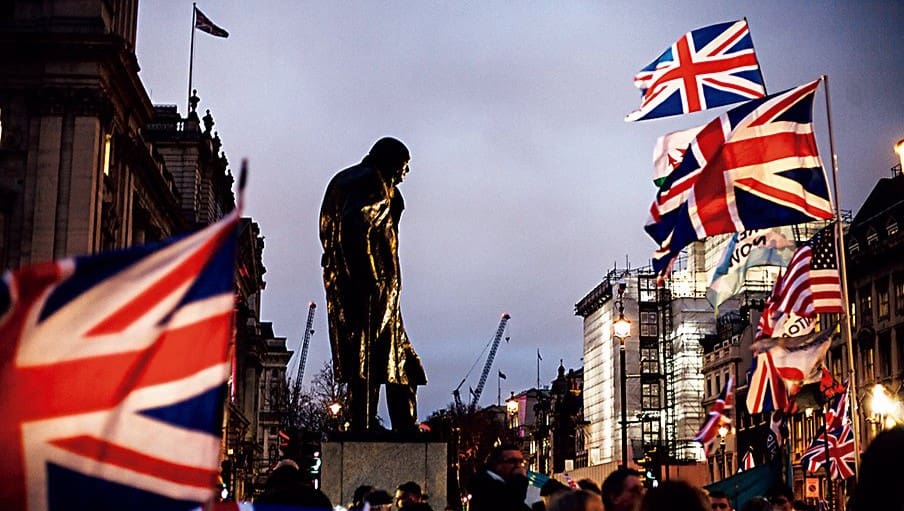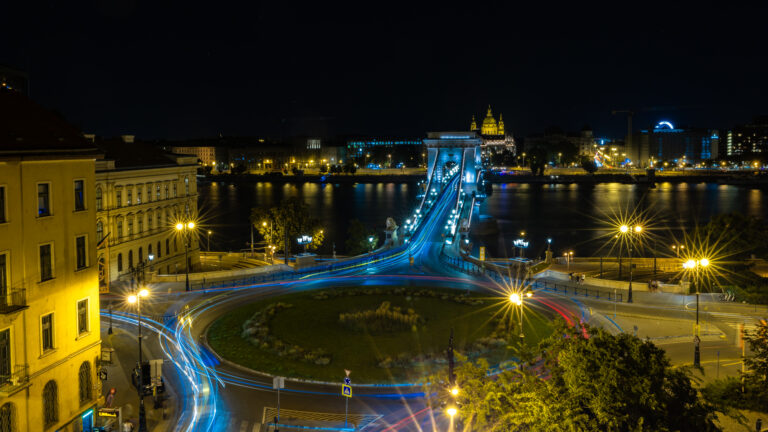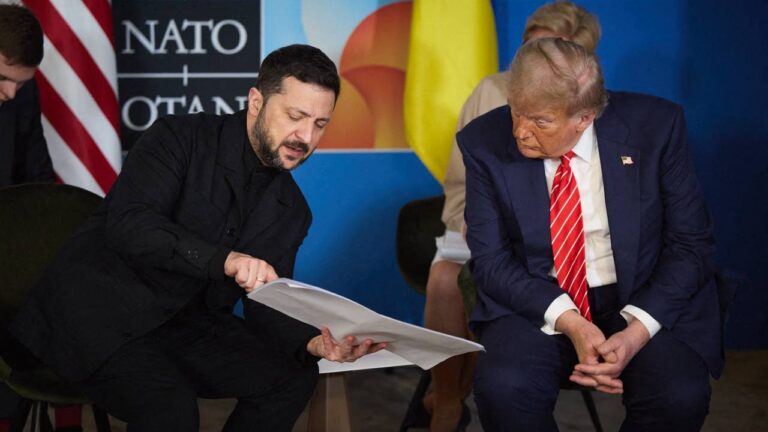This article was published in our print edition’s Special Issue on the European Union.
Hegel remarks somewhere that all great world-historic facts and personages appear, so to speak, twice. He forgot to add: the first time as tragedy, the second time as farce.’1 It is not perhaps usual to begin an essay in the Hungarian Conservative by quoting Karl Marx but it is I think, mutatis mutandis, apposite in this instance. When, on Thursday 23 June 2016, Britain voted by 52 per cent to 48 per cent2 to leave the EU, it should have been the moment at which the country seized itself by the lapels and began to drag itself out of a four-decade-long subservience. Instead, it became a signal instance of how the British political class is unable to grasp opportunity even when (perhaps particularly when) it does not immediately see the possibility.
When Britain emerged from the smouldering ruins of the Second World War, it seemed to senior members of the Conservative Party axiomatic that the country’s future as a trading nation must be as part of a rebuilt, rejuvenated, and rehumanized Europe. Whereas many of those who had fought in the Great War emerged so horrified by its brutality as to be rendered supine when the threat of another war grew with Hitler’s rise, those who had fought in the Second World War entered the century’s middle age with a grimmer mien: that mankind’s essential nature being aggressive, they would cast a web over Europe, entwining its most powerful nations in trade and bureaucracy such that future conflict became practically impossible without mutually assured destruction.
Sir Winston Churchill, physically exhausted by the inestimable demands of wartime premiership yet intellectually still able, much of the time, to run rings around his would-be successors, would give them no succour. Here a speech lauding a United States of Europe; there an article fulminating against the very idea of Britain’s joining such an antithetic body. The Macmillans, Butlers, Douglas-Homes and Heaths fumed, but their vapours rose unsniffed by England’s Lion and the United Kingdom sailed alongside a Europe increasing its ties day by day. In Churchill’s mind, and those of his devoted lieutenants, the country’s destiny remained distinct from both the Continent and the United States of America, trading with them equally easily, alongside the Colonies and Commonwealth. Then came the Suez Crisis in the autumn of 1956 and the realization that America would stand for this not a moment longer. The days of imperial powers being allowed to continue had passed, and the United States was writing its obituary with one hand while delivering the coup de grâce with another—regardless of whether or not the empire in question was a recent ally and deserving, perhaps, of a gentler, more natural demise.
America’s efficient betrayal led to the collapse of one prime minister, Anthony Eden, whose award aged nineteen of the Military Cross and status as the youngest adjutant on the Western Front were arguably too rapid a start for any man, let alone one with such a nervous temperament, to maintain and the installation of another, Harold Macmillan, whose physical pain from several wounds during the First World War and a plane crash in the Second, along with the mental pain of merciless, very public cuckolding and a heavy dose of pessimism, combined to produce a man, in Dominic Sandbrook’s words, ‘devious, theatrical and self-seeking’.3 Cynics will point out that the description might equally apply to Churchill; realists will reply that while most premier politicians have elements of each, they are not their defining characteristics.
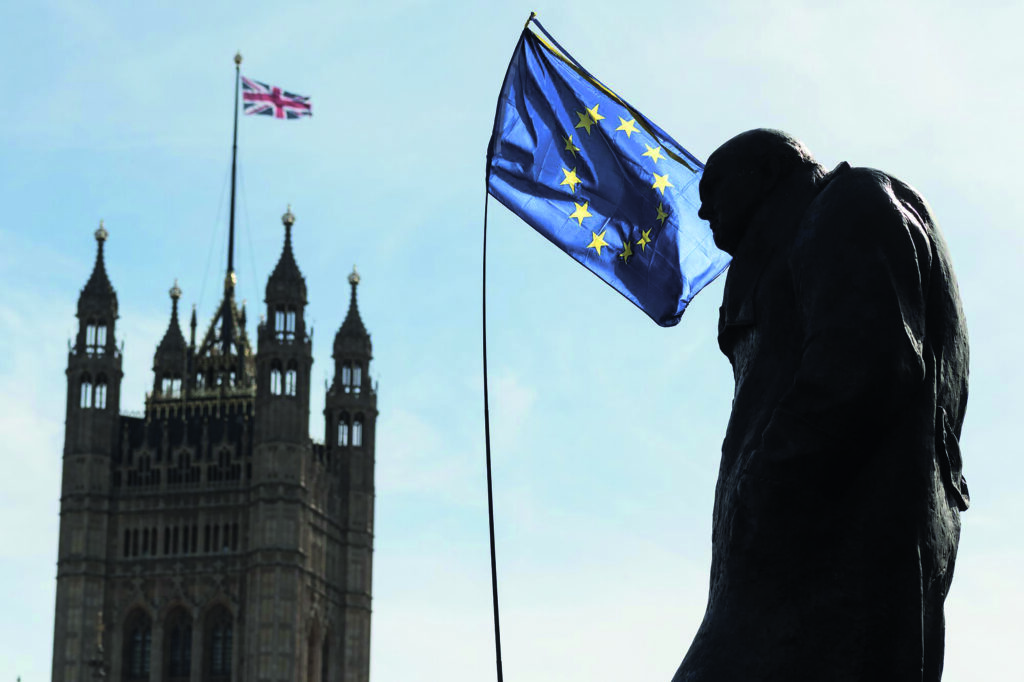
Macmillan was related to John F. Kennedy by marriage and liked, in public, to spin a comforting story of Britain’s being the Athens to America’s Rome, delighting in JFK’s calling him by the family nickname of ‘Uncle Harold’. His private thoughts were less familial: in his diaries, he described the country as ‘hostile’, among other less than flattering epithets. At the same time as forming the European Free Trade area in May 1960, to make America believe that the UK intended to continue being an independent nation, Macmillan had decided to apply for membership of the European Economic Community (EEC), which application he initiated in July 1961. In this he was supported by a healthy majority of his party, though in the face of trenchant opposition from some backbenchers, including Enoch Powell.
De Gaulle’s famous ‘non’ of January 1963 and, therefore, SuperMac’s failure to achieve his major foreign policy objective, were both essentially part of the Second World War’s last act. By the time Edward Heath took Britain into Europe a decade later, the Conservative Party was almost unanimous—once again, however, without Powell, whose animosity towards Heath and Europeanism led him to advocate voting Labour in the 1974 general elections, which was then and has since been considered decisive in denying Heath a second term. Joining the Common Market, as it was known, was part of an effort on Britain’s part to become a consciously ‘modern’ nation, in contradistinction to what was considered its old-fashioned imperial past: one which embraced internationalism, threw off the mantle of empire and strove towards a self-consciously smaller role in the world, but as a corollary, it was claimed, achieving a larger one with our nearest neighbours. Then as now, the easy attractions of gravitational theory beguiled the simple-minded men in grey suits who dominated both the Tory Party and the Civil Service—though the suits have, in the Civil Service at any rate, and much to our detriment as a serious nation, long since been discarded for chinos and polo shirts in the name of accessibility.
Heath claimed repeatedly during the 1972 campaign to join the EEC that it would not mean surrendering national sovereignty over our laws and customs; a straightforward lie, given what he knew to be the Treaty of Rome’s intentions towards a federal Europe. Here a fissure began to appear in Tory politics, between those for whom Europe was the only conceivable future for an increasingly impoverished post-imperial country unable to make its industries competitive, and those who despised the declinism of the Europhiles, believing that with a denationalized economy and a people given the incentive of lower taxation the UK could prosper once more. The same debate was had on the same terms during the Brexit referendum campaign in 2016, the former camp becoming known as ‘Project Fear’, the latter riding under the pledge to ‘Take Back Control’.
The Labour Party had pledged in its February 1974 election manifesto to hold Britain’s first ever national referendum4, on the question of European membership, following an attempt to renegotiate terms. This took place in June 1975, with the ‘Remain’ campaign supported by most of the Labour cabinet (though Wilson had allowed those opposed, a small but politically influential cadre of left-wingers, to campaign for a ‘No’ vote), and the newly elected Conservative Party leader, Margaret Thatcher, together with the vast majority of her parliamentary party. The Remain campaign won by 67 per cent to 33 per cent on a turnout of 64 per cent (significantly lower than the 72 per cent who voted in the 2016 referendum)5 and the matter was considered to have been settled for good. Those who continued to argue against British membership of the EEC and later EU were viewed as being extreme outliers of the Labour and Conservative parties, either hopeless romantics or deluded fantasists depending on the person in question and questioning.
That Mrs Thatcher believed at this time both that the EEC was economically necessary to Britain and that British sovereignty would not be overly impinged upon by membership of the Community there can be little doubt. It took eleven years in government and a constant series of frustrations in negotiation to change her mind on both matters, though her belief that Britain should leave was not expressed unequivocally until the publication of Statecraft: Strategies for a Changing World in 2002. Nevertheless, it was during the 1979–1990 period, under Mrs Thatcher’s prime-ministership, that Euroscepticism in the Conservative Party moved from the fringes inwards, as the insatiable federalism of the European project became more and more apparent. This intensified after the Bruges Speech of 1988, containing Mrs Thatcher’s famous statement that ‘we have not embarked on the business of throwing back the frontiers of state at home only to see a European superstate getting ready to exercise a new dominance from Brussels’.6 The irony is that although posterity considers this speech a flag in the ground in terms of Britain’s diverging from the EEC, it was designed to reassure the Community of precisely the opposite: that Britain would work for reform from within. Nevertheless, it became a foundational text of the independence movement, as demonstrated by the establishment in 1989 of the Bruges Group, Britain’s first avowedly Eurosceptic think tank. This came to be supported by some of Mrs Thatcher’s closest allies, including Norman Tebbit, John Redwood, and Norman Lamont, and by those who would be in the vanguard of the Brexit campaign, most notably Daniel Hannan.
‘Any departure should be envisaged only when the governing party is unquestionably united and able to argue in the strongest terms for following a different path’
The issue of Europe became a suppurating wound on the Tory body politic following its bungled matricide of Mrs Thatcher in November 1990. Psychologically riven by the horror of despatching with the utmost indignity its most successful peacetime leader in a century, the Conservative Party commenced a thirty-year civil war, with Europe as its battleground. It seemed, at first, that the Europhiles—led by men such as Michael Heseltine, John Major, and Kenneth Clarke—would win, particularly with the advent of Tony Blair and Gordon Brown’s government in 1997, the most pro-European administration since Heath’s.
Yet the Eurosceptics refused to roll over and fall into bed with UKIP or other fringe parties, as was so dearly desired by those who had knifed Mrs T. Doggedly they remained, making their arguments at Tory association dinners, in the press, at think tanks, and in Parliament. Vexingly, they gained ground—though admittedly by so gradual a process as to be nigh-on imperceptible at the time but, with two decades’ hindsight, steadily. Crucially, they became more and more common a constituency among young party members, for whom the expansion of Europe’s borders, geographical and cultural, could not be waved away with airy notions of reform from within and maintaining Continental harmony.
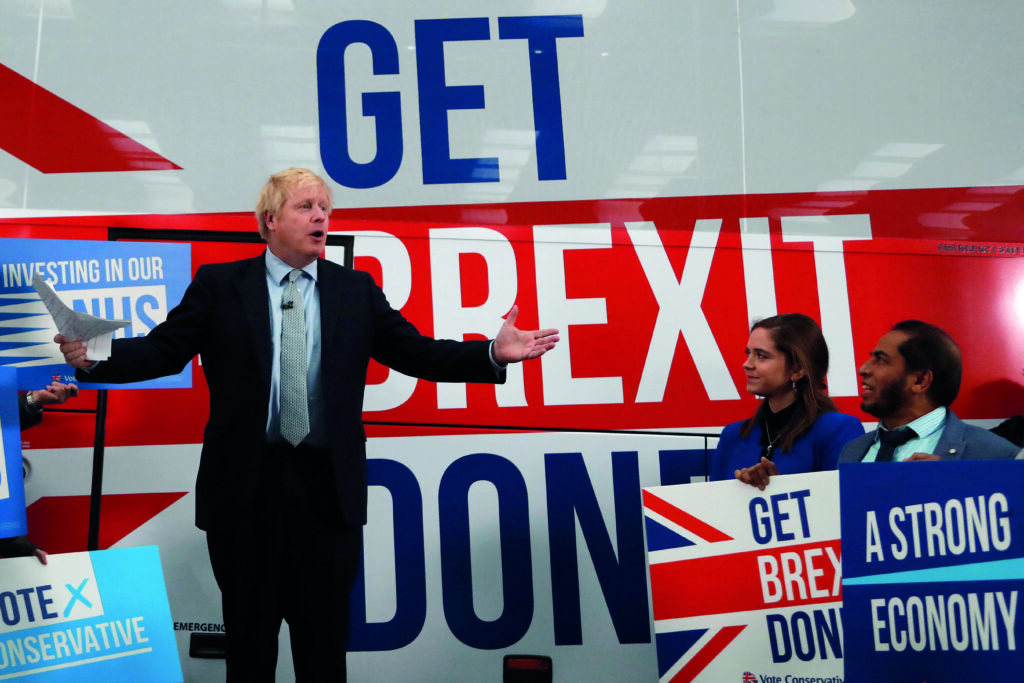
Why, they asked with greater and greater urgency, were we tying ourselves to this burgeoning yet amorphous bloc, merely by dint of its being across the Channel? As technology made global commerce ever less dependent on proximity, as the threat of global terrorism made the possibility of another Franco-German conflict seem risible, and as the European Commission became ever more dismissive of national concerns, identities, and cultures, ever more members of the Conservative Party in Parliament and in the country spoke up for Britain and out against membership of the EU.
The Conservative Party was, however, no longer the country’s default elite, a fact it had failed with staggering ignorance to realize between 1997 and 2010. Successful the arguments to leave may have been with members of the party and increasingly the public, but not for a moment did they gain traction with those who comprised the new cultural, administrative, legal and professional elite. Those who had been installed and cultivated by New Labour, with typical socialist efficiency, as part of undoubtedly the most successful programme of institutional takeover in modern British history cleaved ever more to Europe as our future. So consumed was the Conservative Party by its bitter civil war that it failed to notice how vastly the country had changed since they had lost power. By the time they—or some of them, at least—did, it was too late.
The referendum result of 23 June 2016 infuriated the new elite, but it did not throw them off their stride. If they could not, in the Brechtian formula, dissolve the public and elect another, they could at least see to it that the most popular vote in our nation’s history became so frustrated in execution that its obvious advantages were almost impossible to seize. They were assisted in this by the modern Tory Party’s astounding ability to sabotage itself at every turn. When David Cameron, whose political idol was that other Old Etonian with impeccable connexions and a fatal tendency towards deviousness, Harold Macmillan, walked off the national stage (for the time being, as we now know) whistling his merry tune, any competent party would have recognized the political necessity of, and opportunities afforded by, immediate unity. Instead, one leader of the Brexit movement, Michael Gove, blew up the leadership campaign of the other, Boris Johnson, over a trivial matter of tennis, leading to the unopposed election of Theresa May, who had campaigned for and believed deeply in remaining a part of the EU.
Thus followed three agonizing years of ineptitude, during which Britain hoped against hope for, to quote Marx once again, ‘a grotesque mediocrity to play a hero’s part’. Johnson was called back from his plough and managed, for the first and only time in his otherwise absurd career, to achieve sustained concentration and seriousness. How many opportunities, how many potential jobs, how many billions of pounds Britain lost during those three static years are impossible to calculate. What is possible, however, is the clear recognition that those 17.4 million Britons who voted to leave the EU were betrayed by the political class, assisted with alacrity by an administrative class who held them in utter contempt. That the majority now believe our decision to leave was a mistake could surprise only somebody who has spent the past eight years in Outer Mongolia; that this will lead to the Labour Party under Sir Keir Starmer attempting to rejoin the EU seems a more than likely bet.
‘[A departure] could be achieved only when the administrative class has been purged of Europhilic elements who would seek to frustrate the process of negotiating its exit’
What, then are the lessons for Hungary, should it see its future as diverging from that of the EU? First, that any departure should be envisaged only when the governing party is unquestionably united and able to argue in the strongest terms for following a different path. Second, that it could be achieved only when the administrative class has been purged of Europhilic elements who would seek to frustrate the process of negotiating its exit, particularly given the example of how maliciously French and German officials behaved towards Britain during that process. Third, that leaving alone is exceptionally difficult. Better, therefore, to wait until allies such as the Visegrád Group are also ready to leave, allowing a secession en masse and, perhaps, the formation of an alternative trading and customs union without the federalist nature of the EU.
That Britain chose to join the EEC in 1975 was a tragedy. That it left the EU with the utmost incompetence in 2016 was a farce caused entirely by the Conservative Party’s inability to resolve the psychological trauma of three decades. In both instances, it is the British people who have suffered and they whose trust in politics to be a force for good has, as a consequence, been destroyed.
NOTES
1 Karl Marx, ‘Der 18te Brumaire des Louis Napoleon’, in Die Revolution (New York, 1852).
2 Electoral Commission, ‘EU Referendum Results’, https://web.archive.org/web/20160630063455/https://www.electoralcommission.org.uk/find-information-by-subject/elections-and-referendums/upcoming-elections-and-referendums/eu-referendum/electorate-and-count-information, accessed 7 April 2024.
3 Dominic Sandbrook, Never Had It So Good (London: Little, Brown, 2005).
4 Vaughne Miller, ‘Research Briefings – The 1974-75 UK Renegotiation of EEC Membership and Referendum’, House of Commons Library, https://commonslibrary.parliament.uk/research-briefings/cbp-7253/#fullreport, accessed 7 April 2024.
5 Electoral Commission, ‘EU Referendum Results’.
6 Margaret Thatcher, ‘Speech to the College of Europe (‘The Bruges Speech’), 20 September 1988’, www.margaretthatcher.org/document/107332, accessed 7 April 2024.
Related articles:

